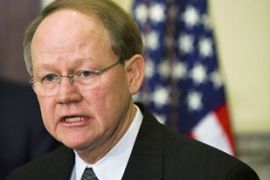US to consider spy law changes
National intelligence chief seeks to ease restrictions on government eavesdropping.

Published On 18 Sep 2007
He is seeking changes to the Protect America Act which Congress adopted, based on McConnell’s warnings of a gap in US intelligence, just before breaking for the summer in August.
The law countered restrictions imposed on government eavesdropping by the Foreign Intelligence Surveillance Act, prompting criticism from civil liberties groups and privacy advocates who say it gives the government broader powers than intended.
The American Civil Liberties Union warns on its website that the Protect America Act “allows for massive, untargeted collection of international communications without court order or meaningful oversight by either Congress or the courts”.
The act lets the government eavesdrop on all communications conducted by a person reasonably believed to be outside the US, even if a US citizen is on the other end of the conversation.
The original Foreign Intelligence Surveillance Act had generally prohibited such surveillance.
‘Electronic surveillance’
McConnell, supported by Kenneth L Wainstein, the assistant attorney general, wants a number of changes to the Foreign Intelligence Surveillance Act, including alterations to the definition of “electronic surveillance”.
The legal definition includes not just which technologies are used to conduct the surveillance, but also who is targeted, what communications are collected, where the target is and where the eavesdropping takes place.
McConnell’s prepared testimony said that the possibility of obtaining a call or email “from a foreign terrorist outside the United States to a previously unknown ‘sleeper’ or co-conspirator inside the United States” was one of the most important new aspects of the act.
But critics argue the changes will give excessive powers to the intelligence agencies.
The Foreign Intelligence Surveillance Act generally requires court orders for any activity deemed to be “electronic surveillance”.
Source: News Agencies